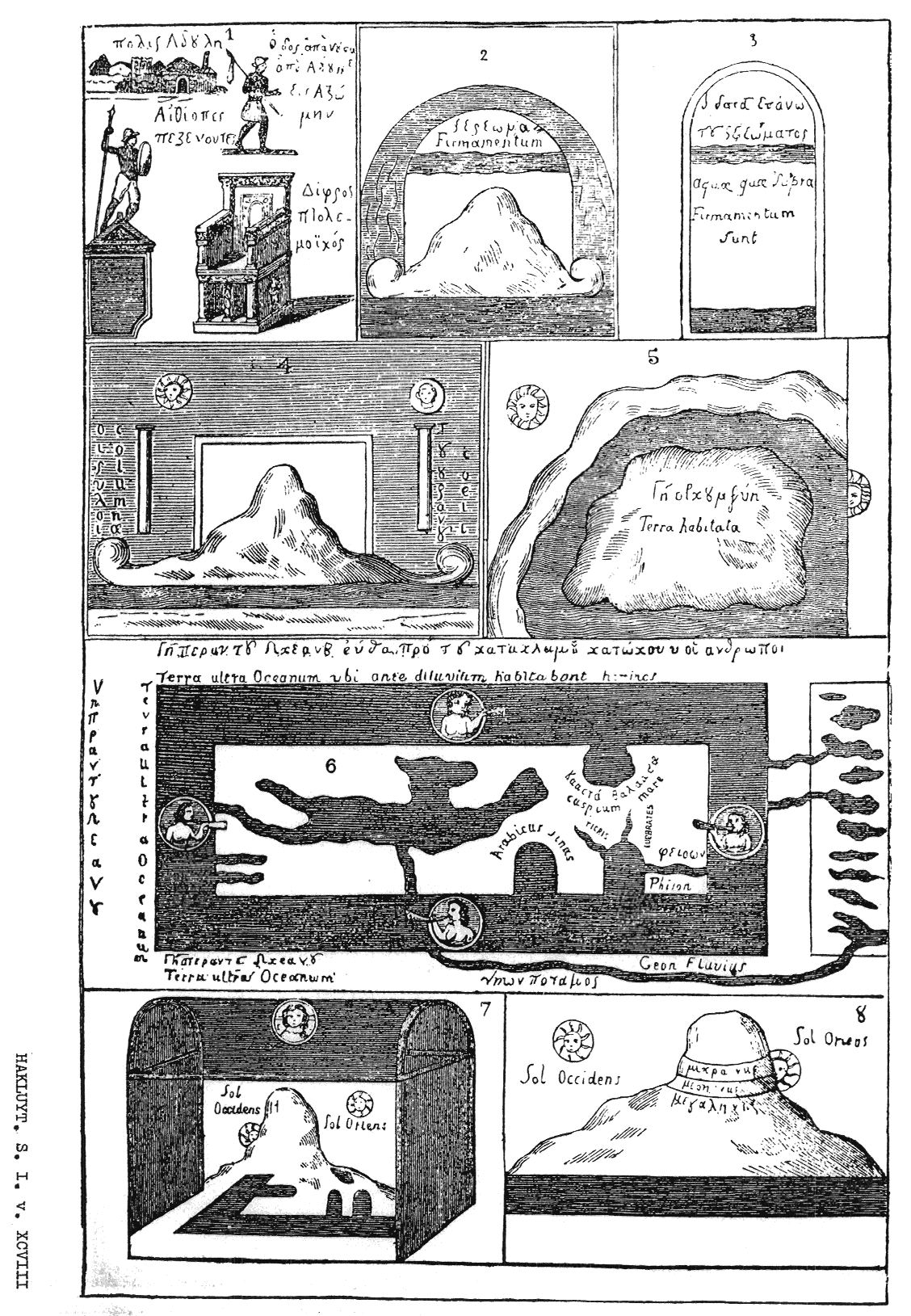 |
| “The world is not a ball”. The night is made by the shadow, thrown by the mountain of the north. Changing the perspective like shown here, in the “Christian Topography” by Cosmas Indicopleustes. I would probably not have found that via Google.
Figure from Cosmas Indicopleustes, Christian Topography, Ed. J. W. McCrindle, Calcutta 1897 |
The strongest arguments prove nothing so long as the conclusions are not verified by experience. Experimental science is the queen of sciences and the goal of all speculation.
Roger Bacon
I have made my mind to start an experiment: I shall not use Google’s search from now on.
Location and occasion that gave birth to this idea was an extended and lively discussion with Benedikt Köhler, Peter T. Lenhart and Sigrid Schwarz that took place last Friday at Galerie Royal – just to the point for the following.
How did we end up with this idea?
There is trigger and a cause for my decision. Last Friday I had – like so many times before – tried to find information on a certain product or brand by googeling. Among the first ten pages of hits, that means the first hundred web-sites that Google decided as being relevant regarding my search, there was not a single link that was actually connected to my search term. Without exception there came up just portals for price comparison, portals for recommendations, or retailers – and a random sample of links that I checked made it quickly clear that none of the the companies behind the links would in fact offer the thing I was looking for, at all. “Find Machiavelli cheap at eBay”, “Buy dust mites at best price at Amazon” – this was the catalyst, but nothing more. I do not want to get into a lament on the bad habit of the SEO/SEM-industry, that bilk us of our lifetime, and the spam they send us by their creapy and impertinent tricks, wasting our bandwidth. This is all commonplace.
The cause for my experiment no longer to search with Google goes deeper. A search engine takes a word or several words which I put into it and delivers the pages in the Net on which those words can be found – ranked by an algorithm. The search engine is thus the extension of what used to be a book’s index. An index leads me quickly to the things that I already knew. I can retrieve the quotes from a book. However an index does not replace the table of contents, let alone an abstract.
At first it appears to be a great relief to have information at hands in full text. What really takes place however, is that we just skip working thoroughly through a topic because we can easily quote and reuse our search results anyway. Instead of risking our own thoughts, we “stand on the shoulders of giants” and these giants appear so overpowering superior that any resistance seems futile. We have so much at our disposition that it feels impossible to contribute anything other then a collage of what already exists. This eclecticism has very well its aesthetic quality. But I personally have an increasingly strong feeling that I do no longer retrieve anything real, and even more, to conceive something, the more I acculturate the technology of search.
This feeling of worthless waste of time I do not get usually from content that is recommended by my friends on Twitter or Facebook, or that I find on the blogs I regularly read. Often I click on a link in my Twitter timeline without in advance seeing where it will lead to, for it is shortened by bit.ly or similar services and thus I hit the completely new and unexpected, and not rarely, this can go on link by link in directions that I would not have predicted.
Also what I may find on social information-networks like Wikipedia or OpenStreetMap usually does mean a lot more to me then the algorithmic results of search engines. Not to the least, this is my motivation to contribute myself something I would belief that others might want to find it.
I do not appreciate total abstinence from the Internet. Fasting does indeed not mean to hunger but to consciously keep within some rules of abstaining from food, and bringing to consciousness what we let go.
My experiment – no Google, just the Web – shall bring clarity to me very personally, what position search takes for me and how it changes me and my work in the Internet. I will try to report my experiences here.
Part 2: Valuable recommandations
2 replies on “Without Google”
[…] [Read this post in English] […]
[…] An example: one of the slowmedia bloggers decided to stop using Google to search. Part of why they did this was because of the imposition of SEO practices in obfuscating the actually useful stuff, which is obvious, but their reasoning goes much deeper: The search engine is thus the extension of what used to be a book’s index. An index leads me quick… […]